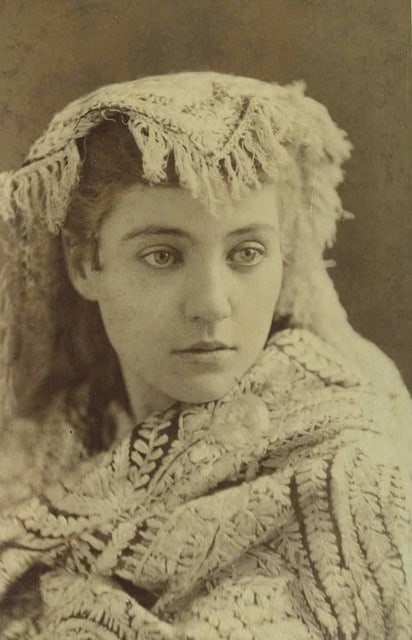
vintage actress Clara Morris
By Mary Hoar, City of Yonkers Historian, President Emerita Yonkers Historical Society, recipient of the 2004 Key to History, Member of the Yonkers Landmarks Preservation Board, and President Untermyer Performing Arts Council
Monday, July 3rd
July 3, 1943: Thirty Habirshaw workers were overcome by chlorine gas at the company’s Point Street plant; seven were hospitalized but company did not notify city emergency services. Yonkers first heard that afternoon, when victim Florence Masterson called her personal physician, who just happened to be our Mayor, Dr. Benjamin Barnes, while still at St. John’s Riverside Hospital. Barnes rushed over with the Rescue Squad and Acting Fire Chief Garvin. They sent Fourth Precinct Police to the plant, but the officers were refused admission by company official Frank Levin.
That morning, a mechanic checking the chlorinating equipment broke a connection on a tank. Employees were moved from the area and given first aid; some were brought to the hospital. The company claimed the incident wasn’t “serious enough to notify the Yonkers Police and Fire department, who arrived at 3:30 pm.” Dr. Barnes, in his capacity as Director of Civilian Protection, stated, “This is not the first time accidents at the plant were not reported to the police… if there is a case, I want to know about it. In all cases of gas leaks, the Fire Department Rescue Squad should be called,” especially since the Rescue Squad had special equipment and training to handle gas leaks. He told the company to look up the law since the Director of Civilian Protection was in charge of all major accidents.
Tuesday, July 4th
July 4, 1781: Washington and his troops marched from Valentine Hill to Dobbs Ferry.
July 4, 1922: The Keskeskick Chapter, DAR, held a reception at Philipse Manor Hall for students in Kristen Kristensen YMCA Citizenship Class; the group had studied citizenship for one year. DAR officers led by chapter Regent Mrs. Charles Rossire and Florence Parson, a member of the Mayor’s City Celebration Committee, welcomed those gathered.
Wednesday, July 5th
July 5, 1877: The Aldermanic Committee appointed to investigate charges of corruption against Alderman Joseph Riley heard testimony from Hugh Kennedy. Kennedy stated in April 1876 he approached Riley about getting a contract from garbage removal in the First and Second Wards, offering a price of $2000. Kennedy said he was told to put in a bid for $1100 for the First Ward and $1050 for the Second. After only receiving the contract for the Second, he went to Riley’s stable and paid him $50, thanking him for the business. Although thoroughly cross-examined by Riley’s lawyer, his testimony was unshaken.
Thursday, July 6th
July 6, 1861: The Mozart Regiment of the Union Army, led by Col. Edward Riley, who had mustered, trained and quartered at Yonkers, left by steamboat for Washington.
July 6, 1933: Frank E. Xavier accepted Presidency of the First National Bank “on the basis of public service in an emergency” after a meeting held at Samuel Untermyer’s Fifth Avenue apartment. Others attending the meeting were Mayor Joseph Loehr, Judge Charles Boote, former judge Benjamin Moore, Walter Haskett, John Crimmins, David Gorfinkel, Arthur Snodgrass, and Reverend Dr. William Hicks. The agenda was limited to election of the president and one board member; Samuel Untermyer took the latter post. All agreed no one seeking elected office should be on the board. Acceptance of both men was contingent on the sale of 40,000 shares in the bank, part of requirement for the bank reorganization plan.
Friday, July 7th
July 7, 1911: Noted emotional actress Clara Morris, living in The Pines, her estate at 537 Riverdale Avenue, recovered her eyesight after being blind for six months.
July 7, 1939: Twelfth Ward Democratic Alderman and former Council President Emmett Giltner resigned from the Yonkers Common Council. He was a victim of the Goldberg Law prohibiting New York City Board of Education employees from holding two government posts. Giltner was Chairman of the Social Service Department at Wadleigh High School in Manhattan. Mayor Loehr appointed William Gordon, head of General Optical Company in Mount Vernon, to succeed Giltner.
Saturday, July 8th
July 8, 1904: The Carnegie Library opened.
July 8, 1938: After visiting a New Jersey explosives company, Mayor Joseph Loehr came home with a keepsake; he dropped a sample of solid gunpowder that looked like licorice into his vest pocket. A few hours after he sent his suit to his tailor to be pressed, he remembered his little souvenir! In a panic, he called the tailor and told him to remove the “licorice”, then rushed to pick it up… and drop it into the Hudson.
Sunday, July 9th
July 9, 1916: Scott Elevator Company held an organization meeting at the home of Campbell Scott. Scott, general manager of the Otis facility here for several years announced the firm had leased property on Saw Mill River Road to build a plant there. Scott was elected president; Louis Spreckels, vice President; Elmer Gorton, secretary-treasurer. In addition to the officers, Anson Baldwin, Daniel Hopping, Dan Nolan and Charles Philip Easton were elected as directors.
July 9, 1938: Deputy City Clerk Frank Van Blarcom announced a sharp drop of requests for marriage licenses since the Desmond-Breitbart law requiring bridal couples to take blood tests went into effect July 1st. Only one license had been issued; during the same period in 1937, 34 licenses were issued. License Clerk William Corbalis believed couples didn’t want the extra expense and mentioned the surge of licenses issued before the July 1st requirement went into effect. Tests had to be done by doctors to certify the couple was free from communicable syphilis.
Questions or comments? Email YonkersHistory1646@gmail.com.
For information on the Yonkers Historical Society, Sherwood House and upcoming events, please visit our website www.yonkershistoricalsociety.org, call 914-961-8940 or email info@yonkershistoricalsociety.org





